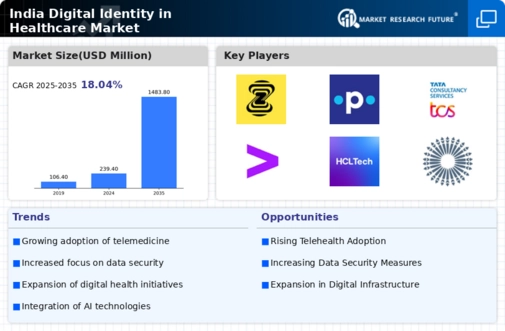Rising Cybersecurity Concerns
Cybersecurity threats pose a significant challenge to the healthcare sector, thereby driving the digital identity-in-healthcare market. With increasing incidents of data breaches and cyberattacks, healthcare organizations in India are compelled to adopt advanced identity management solutions to safeguard sensitive patient information. The healthcare sector has witnessed a 45% increase in cyberattacks over the past year, highlighting the urgent need for robust digital identity frameworks. By implementing multi-factor authentication and secure access protocols, healthcare providers can mitigate risks associated with unauthorized access. This heightened focus on cybersecurity not only protects patient data but also fosters trust among patients, which is essential for the growth of the digital identity-in-healthcare market.
Government Initiatives and Policies
Government initiatives and policies play a crucial role in shaping the digital identity-in-healthcare market. In India, the government has launched several initiatives aimed at enhancing digital health infrastructure, including the Digital India program. These initiatives promote the adoption of digital identity solutions to streamline healthcare services and improve patient access. The government's commitment to improving healthcare delivery through technology is likely to create a conducive environment for the growth of the digital identity market. Furthermore, regulatory frameworks that support the use of digital identities in healthcare are expected to emerge, providing a clear pathway for implementation. This supportive policy landscape is essential for fostering innovation and investment in the digital identity-in-healthcare market.
Integration of Digital Health Records
The integration of digital health records is a pivotal driver for the digital identity-in-healthcare market. In India, the government has initiated various programs aimed at digitizing health records, which necessitates a reliable digital identity framework. The National Digital Health Mission aims to create a comprehensive digital health ecosystem, potentially impacting millions of citizens. As of 2025, it is estimated that over 500 million health records will be digitized, creating a substantial demand for secure identity management systems. This integration not only streamlines patient care but also enhances data sharing among healthcare providers, thereby improving overall healthcare delivery. The digital identity-in-healthcare market stands to benefit significantly from this trend, as secure access to health records is crucial for effective patient management.
Increased Focus on Patient-Centric Care
The shift towards patient-centric care is significantly influencing the digital identity-in-healthcare market. As healthcare providers in India strive to enhance patient experiences, the need for personalized services becomes increasingly apparent. Digital identity solutions enable healthcare organizations to tailor services to individual patient needs, thereby improving satisfaction and outcomes. With a growing emphasis on patient engagement, healthcare providers are likely to invest in technologies that facilitate seamless interactions between patients and providers. This trend is expected to drive the adoption of digital identity solutions, as they play a vital role in ensuring secure and efficient communication. The digital identity-in-healthcare market is thus poised for growth as organizations seek to align their services with the evolving expectations of patients.
Growing Demand for Secure Patient Identification
The digital identity-in-healthcare market is experiencing a surge in demand for secure patient identification solutions. As healthcare providers increasingly prioritize patient safety and data integrity, the need for robust identity verification systems becomes paramount. In India, the healthcare sector is projected to grow at a CAGR of approximately 22% from 2023 to 2028, indicating a significant opportunity for digital identity solutions. The implementation of biometric technologies, such as fingerprint and facial recognition, is likely to enhance the accuracy of patient identification, thereby reducing the risk of medical errors. Furthermore, secure patient identification is essential for compliance with regulatory standards, which further drives the adoption of digital identity solutions in healthcare settings.























Leave a Comment